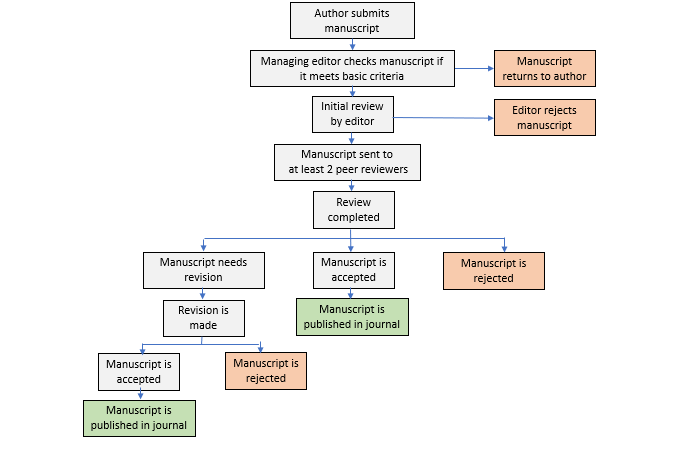Peer review policy
- Page Path
- HOME > Editorial policies > Peer review policy
- Editorial policies
Journal of Trauma and Injury (JTI) has an online submission and peer review system at https://submit.jtraumainj.org/.
All submitted papers, including those invited by the editor, are subject to peer review. The peer review process also applies to the research data and supplementary materials submitted upon initial submission. Manuscripts are first reviewed for its format and adherence to the aims and scope of the journal. Manuscripts not aligning with the aims and scope of JTI or does not adhere to the Instructions for Authors may be promptly returned to the author without review. Prior to peer review, all submissions undergo plagiarism screening using Similarity Check, a plagiarism-detection tool powered by iThenticate (https://www.crossref.org/services/similarity-check/).
All submissions from editors, employees, or Editorial Board members undergo the same review process, and are not involved in reviewer selection or decision-making. Editors do not handle their own manuscripts even if commissioned. Certain publication types, including editorials, errata, corrigenda, retractions, withdrawals, and letters to the editor, are reviewed by the Editorial Board without external peer review.
JTI follows a double-blind peer review policy, ensuring the anonymity of both authors and throughout the review process. However, the editor managing the review process has access to the identities of both authors and reviewers. Each manuscript undergoes peer review by at least two reviewers with relevant expertise. A third reviewer will be assigned if there is a discrepancy between two reviewers. The Editorial Board selects reviewers based on their expertise, publication history, and past reviews. During the review, reviewers can interact directly with the editor alone (via the submission system or email), following the “independent review” approach.
The initial decision is typically made within 2 months of receiving a manuscript. Authors will receive notification of the publication decision, along with reviewers' comments. If there is no correspondence from the Editorial Office regarding the manuscript’s status after 2 months, authors are encouraged to the contact the Editorial Office (office@jtraumainj.org). The Editorial Board may request authors to revise their manuscripts based on the reviewers’ feedback. Authors are required to upload the revised manuscripts along with responses to each reviewer's comments. Revisions should be completed within 90 days of the request. Failure to submit a revised manuscript by the due date will result in the Editorial Board not considering it for publication. Authors can request an extension for revisions, which may be granted at the Editorial Board's discretion. The manuscript review process ideally concludes after the second review. However, the Editorial Board may consider additional review rounds at the authors’ request. If necessary, a professional statistical review by a statistician may be conducted.
The Editorial Board is responsible for the final decision on whether to accept or reject a manuscript after the peer review. Final decisions regarding manuscript publication are made by the Editor-in-Chief or a designated editor who does not have any relevant conflicts of interest. In the event that an editor has a conflict of interest with a submitted manuscript or with the authors, the manuscript will be handled by one of the other editors who does not have a conflict of interest with the review and who is not at the same institution as the submitting editor. In such circumstances, full masking of the process will be ensured so that the anonymity of the peer reviewers is maintained.
The Editorial Board reserves the right to make revisions and edits to the style and structures of the manuscripts within the context, if needed, to ensure adherence to the publication policies and standards of the journal. Once the final decision on publication (accept, revision, or reject) is made, it is directly notified to the corresponding author. Upon final approval and completion of necessary revisions, the expected publication date will be provided. Rejected manuscripts will not be reconsidered.
Any appeals against the editorial decision must be made within 2 weeks of the date of the decision letter. Authors who wish to appeal against a decision should contact the Editor-in-Chief, explaining in detail the reasons for the appeal. All appeals will be discussed with at least one other associate editor. If consensus cannot be reached thereby, an appeal will be discussed at a full editorial meeting. The process of handling complaints and appeals follows the guidelines of the Committee on Publication Ethics (COPE; https://publicationethics.org/appeals). JTI does not consider second appeals.
The review and publication process is illustrated in the following flowchart:

 KST
KST



